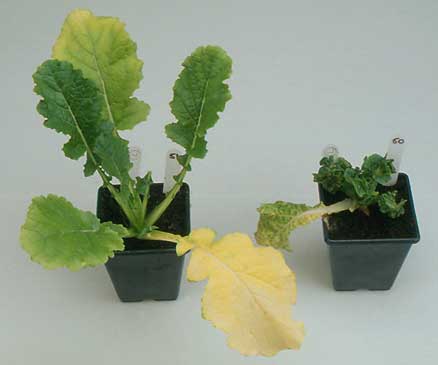United Kingdom
November 18, 2010
Researchers have uncovered the genetic basis of remarkable broad-spectrum resistance to a viral infection that, in some parts of the world, is the most important pathogen affecting leafy and arable brassica crops including broccoli, cauliflower, cabbage, kale, swede and oilseed rape. They have tested resistant plants against a range of different strains of the virus taken from all over the world and so far, no strain has been able to overcome the resistance.
The research on the so-called Turnip mosaic virus (TuMV), led by Dr John Walsh of the University of Warwick and funded under the BBSRC Crop Science Initiative, has been taken forward in a new partnership with Syngenta Seeds.

A Turnip mosaic virus (TuMV) – resistant plant (left) and a susceptible plant (right) following challenge with TuMV. Copyright: Dr John Walsh, The University of Warwick
Dr Walsh said "TuMV causes really nasty-looking black necrotic spots on the plants it infects - 'a pox on your' vegetables! This can cause significant yield losses and often leaves an entire crop unfit for marketing. At best, a field of badly affected Brussels sprouts might provide some animal fodder, but these vegetables would not be appealing to most shoppers. The virus is particularly difficult to control because it is transmitted so rapidly to plants by the insect vectors."
Dr Walsh and his team identified the major gene involved in resistance to TuMV and discovered that the way in which it creates resistance is completely new. Using this knowledge, they found that it was possible to identify plants with an inherent resistance that could be used to speed up the breeding process and develop commercial varieties that are resistant to TuMV.
The team from University of Warwick are now working with industry partner Syngenta Seeds to breed resistance into Chinese cabbage. They hope in future to do the same with other crops such as broccoli, cabbage and kale.
Peter van der Toorn, R&D Lead Leafy Crops, Syngenta Seeds Vegetables said "Working in partnership with academic researchers is very important for us. Through such collaborations it's possible to take an idea from pre-commercial research and turn it into a new variety that can benefit the consumer and boost our contribution to the UK economy. We are very excited to be working together with academics at the University of Warwick to breed varieties with improved resistance to Turnip mosaic virus."
Professor Douglas Kell, BBSRC Chief Executive said "Bioscience research in all its forms has always given rise to developments that have impacts in society - whether predicted or serendipitous. Such developments need a structure through which to realise their potential and a partnership such as this one between the University of Warwick researchers and Syngenta will be important to ensure that resistance to diseases is incorporated into commercial crop varieties. These new resistant varieties would then be available to contribute towards future food security."
Click here for more photos